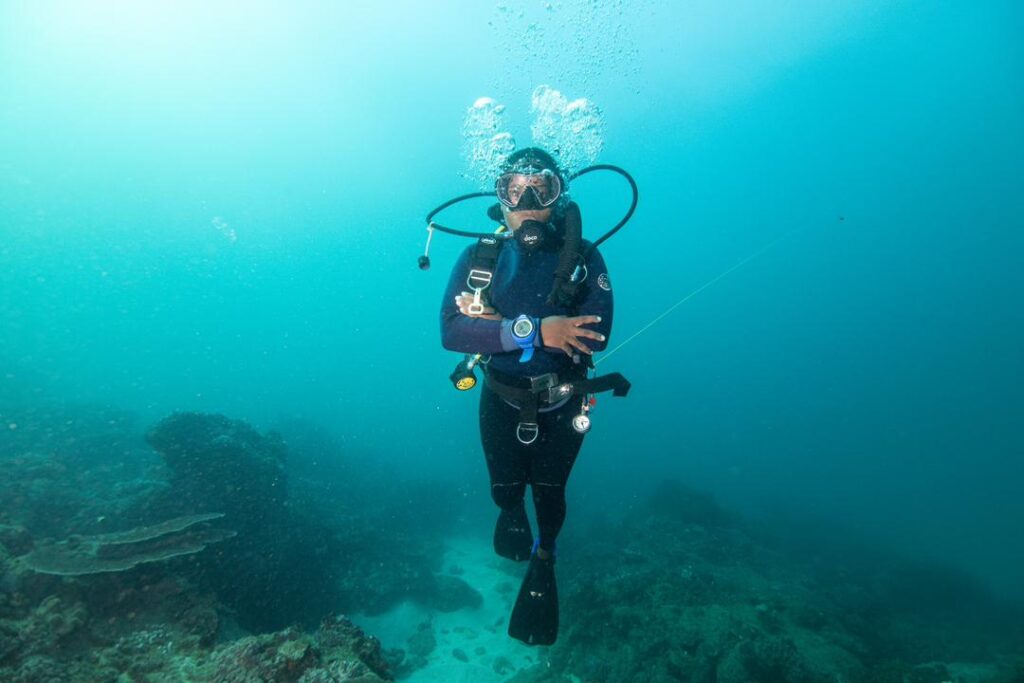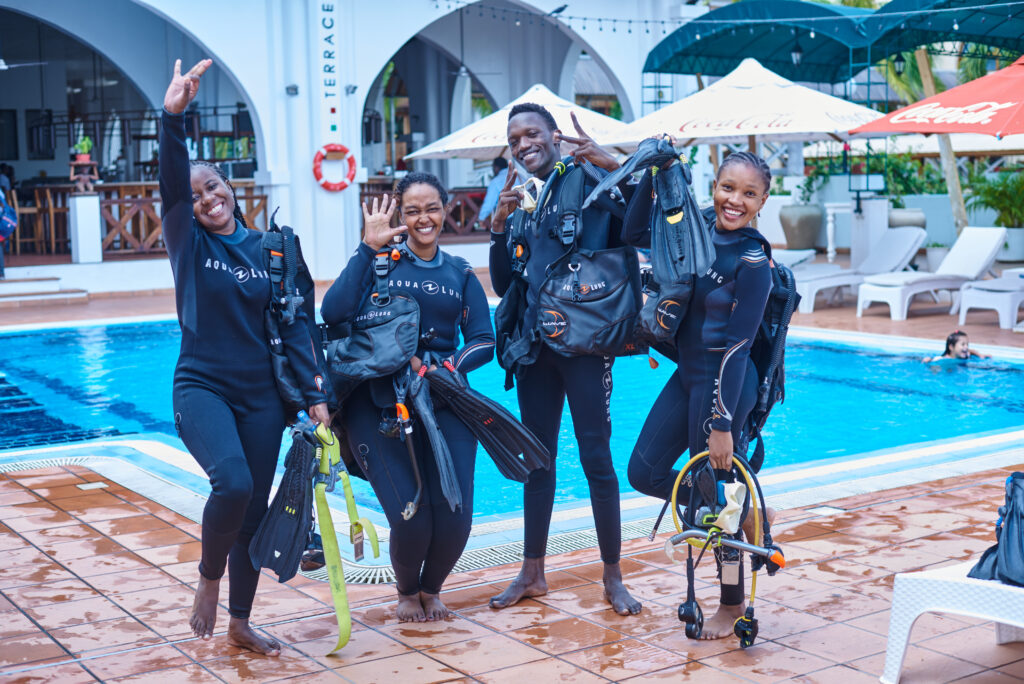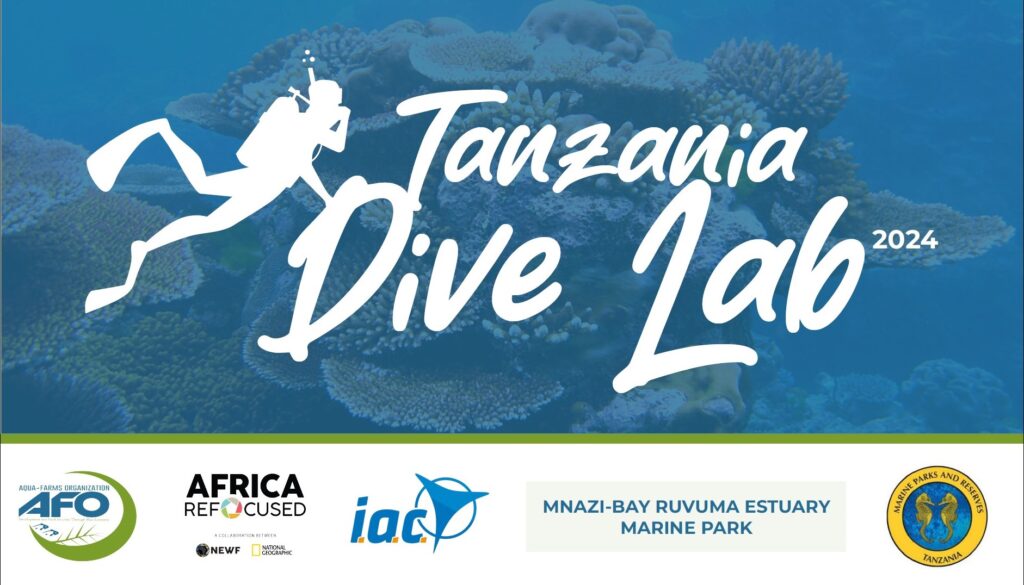Since 2021, Aqua Farms Organization has been investing in the next generation of Ocean leaders in partnership with Africa refocused program, a partnership between Nature, Environment, Wildlife and Filmmaking Organization (NEWF) and National Geographic Society through Tanzania Dive labs
For the past 3 years, over 25 individuals have been certified under different scuba levels from Open water scuba divers to Divemaster level. The Dive labs entail local marine scientists, Storytellers and Filmmakers. By combining the expertise of marine scientists with the creative talents of storytellers and filmmakers, these labs foster a multidisciplinary approach to marine conservation and education. Scientists have the ability to provide critical insights into marine ecosystems and conservation challenges, while storytellers and filmmakers capture and disseminate these stories in engaging and impactful ways. This blending of talent not only enhances public understanding and appreciation of marine environments but also inspires collective action towards their protection, thereby bridging the gap between scientific research and public awareness through compelling narratives and visual storytelling.
Why is Tanzania dive labs important and why do we need to invest in the next generation of Ocean leaders especially those coming from the global south?
There are a number of factors that hold back African Marine Scientists in regard to their relationship with the ocean and this is perpetuated with a number of factors. African marine scientists face several barriers in experiencing life below water such as: Historical exclusion and systemic barriers in education and employment which limits their access to marine science opportunities; Discriminatory practices in academia and the sciences which have perpetuated their underrepresentation, and the overall lack of diversity in STEM fields reflects broader societal inequalities and biases that affect their career pathways. Furthermore, many African Marine Scientists have faced limited exposure to marine environments and related educational resources which impacts their interest in pursuing marine sciences, Nevertheless economic disparities and lack of financial support forms a great barrier to pursue certification such as that of scuba diving to pursue careers in deep water research/conservation hence feeling limited and lastly, fear of water which is perpetuated with narratives that the ocean is a place for fear have excluded many to even consider having a career in ocean spaces.
Tanzania Dive Labs plays a crucial role in fostering the next generation of ocean leaders, particularly those from the global south. This initiative not only provides essential training in scuba diving for free through partnerships and collaborations but also empowers individuals with the skills and knowledge necessary to become stewards of marine ecosystems. By offering certifications from Open Water Scuba Diving to Divemaster levels, Tanzania Dive Labs equips participants with the technical expertise required for underwater exploration, research, and conservation efforts. This hands-on experience is invaluable for understanding the complexities of marine environments and the urgent need for their preservation.
Investing in the next generation of ocean leaders, especially those from the global south, is essential for several reasons. Firstly, countries in the global south are often at the frontline of climate change and environmental degradation, making it imperative for local communities to be actively involved in conservation efforts. Empowering young leaders from these regions ensures that those most affected by environmental challenges have the skills and agency to address them. Moreover, local leaders bring a unique perspective and a deep understanding of the socio-cultural and ecological contexts of their regions, leading to more effective and sustainable conservation strategies. Fostering ocean leaders from the global south promotes inclusivity and diversity in global environmental governance. Historically, the narrative and leadership in marine conservation have been dominated by voices from the global north. By investing in young leaders from the global south, initiatives like Tanzania Dive Labs help to democratize marine conservation, ensuring that a broader range of experiences and ideas are represented. This inclusivity is crucial for developing holistic solutions that are equitable and just.
Furthermore, the trending agenda on the blue economy holds significant potential for job creation and economic development in the global south. By training young leaders in marine conservation and scuba diving, through initiatives like Tanzania Dive Labs not only contribute to environmental sustainability but also open up new economic opportunities for the local ocean leaders. These trained professionals can pursue careers in ecotourism, marine deep water research, and conservation projects, driving sustainable development in their communities. Tanzania Dive Labs is essential for building a cadre of skilled and knowledgeable ocean leaders. Investing in these young leaders is critical for effective and inclusive marine conservation, as well as for unlocking the economic potential of the blue economy in these regions. By empowering local communities with the tools and training they need, we can ensure a more sustainable and equitable future for our oceans and the people who depend on them.
The 2024 Tanzania Dive Lab is a collaboration between Aqua-Farms Organization, the Africa Refocused Program (NEWFx NatGeo), the International Aquanautic Club, and the Mnazi Bay-Ruvuma Estuary Marine Park, located on the southern coast of Tanzania. Our goal is to have more than 20 Open Water Scuba Divers and 6 Divemasters, marking the largest scuba diving certification event ever to happen locally in Tanzania. We are leading the way—come join us!
Authored by Nancy Iraba



